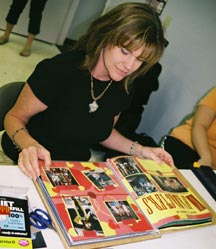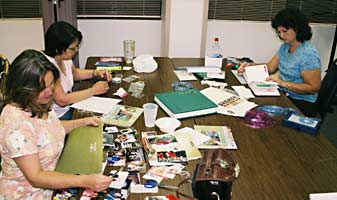Georgia minister produces movie as tool for ministry
Posted: 9/15/06
| Alex Kendrick, a minister at an Albany, Ga., church, plays Coach Grant Taylor in Facing the Giants, a movie he and his brother, Stephen, produced with a cast of volunteers in his community. (RNS photo courtesy of Sherwood Pictures) |
Georgia minister produces
movie as tool for ministry
By Adelle Banks
Religion News Service
ALBANY, Ga. (RNS)—When Alex Kendrick thinks about sharing his faith, he thinks about movie screens, not evangelistic tracts.
Kendrick, associate pastor of media ministries at Sherwood Baptist Church in Albany, Ga., has co-produced Facing the Giants with the help of hundreds of volunteers—on screen and behind the scenes—from his Southern Baptist congregation and local community.
On Sept. 29, the movie about a Christian high school football team will premiere on 400 movie screens in 86 markets. In addition to co-writing the script with his brother Stephen, Kendrick plays the lead character of the movie, Coach Grant Taylor.
“This is a ministry tool,” said Kendrick, who handles the television and video productions at the 3,000-member church. “I think churches are waking up to the fact that this is a valid avenue of ministry. … People still love a good story.”
Movies and ministry have been combined for decades, with organizations like the Billy Graham Evangelistic Association producing films, and pastors sprinkling their sermons with movie clips. Evangelical churches played a big role in getting audiences to The Passion of the Christ, and Christian bookstores offer family-friendly film fare. Now, this congregation has decided to become involved in moviemaking itself with its own company, Sherwood Pictures.
Research by the California-based Barna Group reveals 66 percent of adults say they talk with friends and associates about movies and TV shows they’ve seen recently. But, founder George Barna said, “The majority of people who have attended a church service cannot even remember the theme of the sermon within two hours of leaving the building.”
Those types of figures fueled the church’s interest in making movies as an expression of faith, said Pastor Michael Catt of Sherwood Baptist Church. “Rather than waiting for people to come to us, let’s go to them.”
Facing the Giants is built around the struggling Eagles football team at the fictional Shiloh Christian Academy. A local layman walks down a hallway of lockers praying for the student body. The coach turns to the Bible as his wife falls to her knees in a battle against infertility.
Unlike a typical Hollywood production, Facing the Giants was made with hardly any paid professionals. More than 500 people helped in a variety of ways, from babysitting to donating meals and serving as extras. The credits give the sense of the grassroots effort—listing everyone from the “prayer coordinator” to the local restaurants and supermarkets that provided food.
Church members donated $100,000 for the film, and Provident Films and Sherwood Pictures worked together on enhancing the color of the low-budget movie. A soundtrack includes Provident Music Group artists such as Third Day and Casting Crowns. Sony Pictures is distributing it through Samuel Goldwyn Films.
On screen and off, Kendrick opts for a direct message about his beliefs.
The coach sparks a turnaround on his team—which eventually faces the formidable Giants—when he urges players to not think of their own glory but glorifying God instead.
In real life, he hopes the movie will draw people closer to God, whether they’re already believers or not.
“Everybody faces giants,” said Kendrick. “It may be fear. It may be failure. It may be inferiority or something else. And one of the messages in this movie … is that you can’t always face your giants on your own. … And that’s where you have to rely on the Lord.”
Barna’s company has hosted screenings of Facing the Giants for secular and religious groups, and Barna himself has launched a new Christian entertainment company, Good News Holdings, to produce its own version of faith-related movies. Barna’s first project is an adaptation of author Anne Rice’s Christ the Lord: Out of Egypt.
“We realize there are some people who are open to and even appreciative of a very direct faith-oriented message,” Barna said. “Some people who, because they’re coming to be entertained, aren’t looking for something that always leads back to faith. From my perspective, you’ve got to have different approaches, where sometimes it’s direct, sometimes it’s indirect but it’s theologically correct.”
But any movie that has a blatant message about needing Jesus in your life—as Facing the Giants does—could end up with a narrower audience than its producers hope.
Sherwood Baptist Church’s senior pastor, and others involved in the movie’s production hope it will present a picture of everyday lives of Christians and encourage others to start or renew a Christian commitment.
“We’d like to see people’s lives changed,” Catt said.
News of religion, faith, missions, Bible study and Christian ministry among Texas Baptist churches, in the BGCT, the Southern Baptist Convention ( SBC ) and around the world.



